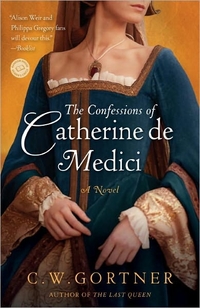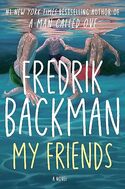 THE TRADWIFE'S SECRET |
|
 Best Historical Summer Reads
The ambitious, gripping tale of one of history?s most notorious and misunderstood queens . . .
Ballantine Books The truth is, none of us are innocent. We all have sins to confess. So reveals Catherine de Medici in this brilliantly imagined novel about one of history’s most powerful and controversial women. To some she was the ruthless queen who led France into an era of savage violence. To others she was the passionate savior of the French monarchy. Acclaimed author C. W. Gortner brings Catherine to life in her own voice, allowing us to enter into the intimate world of a woman whose determination to protect her family’s throne and realm plunged her into a lethal struggle for power. The last legitimate descendant of the illustrious Medici line, Catherine suffers the expulsion of her family from her native Florence and narrowly escapes death at the hands of an enraged mob. While still a teenager, she is betrothed to Henri, son of François I of France, and sent from Italy to an unfamiliar realm where she is overshadowed and humiliated by her husband’s lifelong mistress. Ever resilient, Catherine strives to create a role for herself through her patronage of the famous clairvoyant Nostradamus and her own innate gift as a seer. But in her fortieth year, Catherine is widowed, left alone with six young children as regent of a kingdom torn apart by religious discord and the ambitions of a treacherous nobility. Relying on her tenacity, wit, and uncanny gift for compromise, Catherine seizes power, intent on securing the throne for her sons. She allies herself with the enigmatic Protestant leader Coligny, with whom she shares an intimate secret, and implacably carves a path toward peace, unaware that her own dark fate looms before her—a fate that, if she is to save France, will demand the sacrifice of her ideals, her reputation, and the passion of her embattled heart. From the fairy-tale châteaux of the Loire Valley to the battlefields of the wars of religion to the mob-filled streets of Paris, The Confessions of Catherine de Medici is the extraordinary untold journey of one of the most maligned and misunderstood women ever to be queen. Excerpt Blois, 1589 I am not a sentimental woman. Even during my youth I wasn't given to melancholia or remorse. I rarely looked back, rarely paused to mark the passage of time. Some would say I do not know the meaning of regret. Indeed, if my enemies are to be believed, my unblinking eyes stare always forward, focused on the future; on the next war to fight; the next son to exalt; the next enemy to vanquish. How little they know me. How little anyone knows me. Perhaps it was ever my fate to dwell alone in the myth of my own life, to bear witness to the legend that has sprung around me like some venomous bloom. I have been called murderess and opportunist, savior and victim. And along the way, become far more than was ever expected of me, even if loneliness was always present, like a faithful hound at my heels. The truth is, none of us are innocent. We all have sins to confess. * * * PART I 1527 – 1532 The Tender Leaf One I was ten years old when I discovered I might be a witch. I sat sewing with my aunt Clarice, as sunlight spread across the gallery floor. Outside the window I could hear the splashing of the courtyard fountain, the cries of the vendors in the Via Larga and staccato of horse hooves on the cobblestone streets, and I thought for the hundredth time that I couldn't stay inside another minute. "Caterina Romelo de Medici, can it be you've finished already?" I looked up. My late father's sister Clarice de' Medici y Strozzi regarded me from her chair. I wiped my brow with my sleeve. "It's so hot in here," I said. "Can't I go outside?" She arched her eyebrow. Even before she said anything, I could have recited her words, so often had she drummed them into my head: "You are the Duchess of Urbino, daughter of Lorenzo de Medici and his wife Madeleine de la Tour, who was of noble French blood. How many times must I tell you, you must restrain your impulses in order to prepare for your future?" I didn't care about the future. I cared that it was summer and here I was cooped up in the family palazzo forced to study and sew all day, as if I might melt in the sun. I clapped my embroidery hoop aside. "I'm bored. I want to go home." "Florence is your home; it is your birth city," she replied. "I took you from Rome because you were sick with fever. You're fortunate you can sit here and argue with me at all." "I'm not sick anymore," I retorted. I hated it when she used my poor health as an excuse. "At least in Rome, Papa Clement let me have my own servants and a pony to ride." She regarded me without a hint of the ire that the mention of my papal uncle always roused in her. "That may be but you are here now, in my care, and you will abide by my rules. It's mid-afternoon. I'll not hear of you going outside in this heat." "I'll wear a cap and stay in the shade. Please, Zia. You can come with me." I saw her trying to repress her unwilling smile as she stood. "If your work is satisfactory, we can take a stroll on the loggia before supper." She came to me, a thin woman in a simple gray gown, her oval face distinguished by her large liquid-black eyes—the Medici eyes, which I had inherited, along with our family's curly auburn hair and long-fingered hands. She swiped up my embroidery. Her lips pursed when she heard me giggle. "I suppose you think it's funny to make the Holy Mother's face green? Honestly, Caterina; such sacrilege." She thrust the hoop at me. "Fix it at once. Embroidery is an art, one you must master as well as your other studies. I'll not have it said that Caterina de Medici sews like a peasant." I thought it best not to laugh and began picking out the offensive color, while my aunt returned to her seat. She stared off into the distance. I wondered what new trials she planned for me. I did love her but she was forever dwelling on how our family prestige had fallen since the death of my great grandfather, Lorenzo Il Magnifico; of how Florence had been a center of learning renowned for our Medici patronage, and now we were but illustrious guests in the city we had helped build. It was my responsibility, she said, to restore our family's glory, as I was the last legitimate descendant of Il Magnifico's bloodline. I wondered how she expected me to accomplish such an important task. I'd been orphaned shortly after my birth; I had no sisters or brothers and depended on my papal uncle's goodwill. When I once mentioned this, my aunt snapped: "Clement VII was born a bastard. He bribed his way to the Holy See, to our great shame. He's not a true Medici. He has no honor." Given his prestige, if he couldn't restore our family name I didn't know how she expected me to. Yet she seemed convinced of my destiny, and every month had me dress in my uncomfortable ducal finery and pose for a new portrait, which was then copied into miniatures and dispatched to all the foreign princes who wanted to marry me. I was still too young for wedlock, but she left me no doubt she'd already selected the cathedral, the number of ladies who would attend me— All of a sudden, my stomach clenched. I dropped my hands to my belly, feeling an unexpected pain. My surroundings distorted, as if the palazzo had plunged underwater. Nausea turned my mouth sour. I came to my feet blindly, hearing my chair crash over. A terrifying darkness overcame me. I felt my mouth open in a soundless scream as the darkness widened like a vast ink stain, swallowing everything around me. I was no longer in the gallery arguing with my aunt; instead, I stood in a desolate place, powerless against a force that seemed to well up from deep inside me . . . I stand unseen, alone among strangers. They are weeping. I see tears slip down their faces, though I can't hear their laments. Before me is a curtained bed, draped in black. I know at once something horrible lies upon it, something I should not see. I try to stay back but my feet move me toward it with the slow certainty of a nightmare, compelling me to reach out a spotted, bloated hand I do not recognize as my own, part the curtains, and reveal— "Dio Mio, no!" My cry wrenched from me. I felt my aunt holding me, the frantic caress of her hand on my brow. I had a terrible stomach ache and lay sprawled on the floor, my embroidery and tangled yarns strewn beside me. "Caterina, my child," my aunt said. "Please, not the fever again. . ." As the strange sensation of having left my own body began to fade, I forced myself to sit up. "I don't think it's the fever," I said. "I saw something: a man, lying dead on a bed. He was so real, Zia . . . it scared me." She stared at me. Then she whispered, "Una visione," as if it was something she'd long feared. She gave me a fragile smile, reaching out to help me to my feet. "Come, that's enough for today. Let us go take that walk, si? Tomorrow we'll visit the Maestro. He'll know what to do." 
Our Past Week of Fresh Picks
A marriage is between two people.And their millions of followers.‘Will keep you turning the pages well into the night’ Catherine CooperMadison Read More »
Don\'t miss out on the stunning DELUXE LIMITED EDITION while supplies last. This breathtaking collectible is only available on a limited first print run Read More »
“Southern bestselling sensation” (Katie Couric Media) Kristy Woodson Harvey returns with a delightfully moving new novel about a mother-daughter duo learning to Read More »
INSTANT NEW YORK TIMES BESTSELLERA Most Anticipated Book of 2025: Goodreads • USA TODAY • Marie Claire &bull Read More »
She\'s right. It can never happen again. She won\'t let it.Ten years have passed, and Ren Taylor is back at square one Read More »
The New York Times and #1 internationally bestselling Department Q series comes to a thrilling conclusion when the team must turn inward Read More »
From Jess Kidd, the bestselling author of Things in Jars who “is so good it isn’t fair” (Erika Swyler Read More »
Two sisters living on Martha\'s Vineyard during World War II find hope in the power of storytelling when they start a wartime book club Read More » |
|
| |||
|
||||




















 © 2003-2025
© 2003-2025